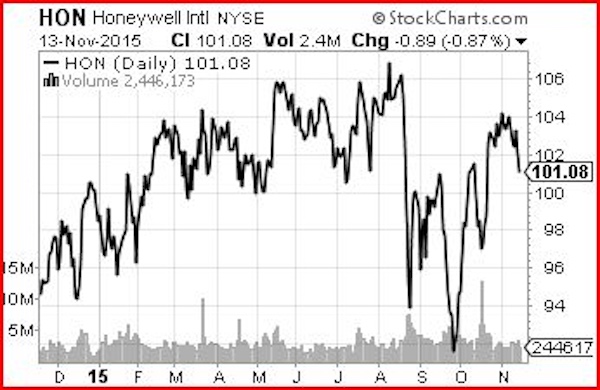Why Honeywell Stock Is Particularly Attractive Now
Ignore the doom and gloom. Keep your eye on stock fundamentals.

Profit and prosper with the best of Kiplinger's advice on investing, taxes, retirement, personal finance and much more. Delivered daily. Enter your email in the box and click Sign Me Up.
You are now subscribed
Your newsletter sign-up was successful
Want to add more newsletters?

Delivered daily
Kiplinger Today
Profit and prosper with the best of Kiplinger's advice on investing, taxes, retirement, personal finance and much more delivered daily. Smart money moves start here.

Sent five days a week
Kiplinger A Step Ahead
Get practical help to make better financial decisions in your everyday life, from spending to savings on top deals.

Delivered daily
Kiplinger Closing Bell
Get today's biggest financial and investing headlines delivered to your inbox every day the U.S. stock market is open.

Sent twice a week
Kiplinger Adviser Intel
Financial pros across the country share best practices and fresh tactics to preserve and grow your wealth.

Delivered weekly
Kiplinger Tax Tips
Trim your federal and state tax bills with practical tax-planning and tax-cutting strategies.

Sent twice a week
Kiplinger Retirement Tips
Your twice-a-week guide to planning and enjoying a financially secure and richly rewarding retirement

Sent bimonthly.
Kiplinger Adviser Angle
Insights for advisers, wealth managers and other financial professionals.

Sent twice a week
Kiplinger Investing Weekly
Your twice-a-week roundup of promising stocks, funds, companies and industries you should consider, ones you should avoid, and why.

Sent weekly for six weeks
Kiplinger Invest for Retirement
Your step-by-step six-part series on how to invest for retirement, from devising a successful strategy to exactly which investments to choose.
It was only two years ago that David Fish, Moneypaper executive editor, observed that "(m)ost of the 'noise' coming out of Wall Street focuses on how high the major indexes have risen and whether the new highs represent a peak." His point? The market pundits were all suggesting that a new bear market might be just around the corner.
Now the “noise” focuses on how the major indexes have fallen this year and the difficulty they have in sustaining each rebound. In other words, a new bear market might be just around the corner, pundits say. The argument is that there are fewer companies with strong earnings growth, which would lead to a collapse in investor confidence just as the Fed begins to raise interest rates.
So it seems that doom lies just around the corner whether stocks are too strong or too weak. Add in weak commodity prices and the plethora of geopolitical unrest, and you have the perfect cocktail of doom and gloom.
From just $107.88 $24.99 for Kiplinger Personal Finance
Become a smarter, better informed investor. Subscribe from just $107.88 $24.99, plus get up to 4 Special Issues

Sign up for Kiplinger’s Free Newsletters
Profit and prosper with the best of expert advice on investing, taxes, retirement, personal finance and more - straight to your e-mail.
Profit and prosper with the best of expert advice - straight to your e-mail.
But let’s step back. If history is any guide, it should be clear that the worries of two years ago ignored the fact that market peaks are generally preceded by a series of new highs, sometimes stretching out over several years.
This year, the volatility and uncertainty ignores the fact that, in the short term, markets are driven as much by emotion as by logic, but strong business operations lead to higher stock prices over the long term.
Our belief now, as it was two years ago, is that investors should focus on the fundamental values of the particular stocks that they own. Strong businesses continue to deliver rising profits (and dividends) year after year, despite the hand-wringing and confusion of traders and pundits, who are in the business of making noise. Don't forget the importance of the “Off” button.
Twice each month, we focus attention on a DRIP stock that appears likely to reward the long-term investor. Our current special is Honeywell International (HON).

Founded in 1920, Honeywell is a global diversified technology and manufacturing company with about $40 billion in annual sales. It operates in four segments: Aerospace (turbine propulsion engines, auxiliary power units, environmental control systems) provides over 30% of sales; Automation and Control Solutions (sensing and security systems for buildings, homes, and industry) over 40%; Transportation (turbochargers, thermal systems, electronic components, and other automotive products) about 10%; and Specialty Materials (resins, chemicals, fibers, films, adhesives) the remainder.
According to Yahoo! Finance, the consensus estimates of 22 analysts call for Honeywell to earn about $6.10 per share this year and $6.56 in 2016, compared with $5.56 in 2014. There are 770.7 million shares outstanding, which is down from 862.3 million in 2003. The dividend has been increased in 10 of the last 11 years, and the most recent increase of 15%, to $2.38 per share annually, provides a 2.3% yield.
What makes Honeywell attractive now is its size and available resources, along with those expectations of higher earnings in the next couple of years. HON has a market capitalization of about $78 billion and an A credit rating, according to Morningstar, which also accords it a wide moat that should deter competitors, a valuable trait during tough economic times, if they should arise. Notably, the newly raised dividend results in a payout ratio of just 39% of earnings, leaving Honeywell with plenty left over for capital expenditures, even in the event of a decline in sales and earnings. Ongoing share repurchases should also enhance per-share results, but can be slowed or suspended if necessary, making the company a "safe haven" during difficult economic conditions.
Honeywell is just one of the high-quality companies that offer investing through a dividend reinvestment plan (DRIP). Honeywell does not charge fees for cash investments or dividend reinvestments through its DRIP. Click here for a list of other no-fee DRIPs.
Ms. Vita Nelson is one of the earliest proponents of dividend reinvestment plans (DRIPs) and a knowledgeable authority on the operations of these plans. She provides financial information centered around DRIP investing at www.drp.com and www.directinvesting.com. She is the Editor and Publisher of Moneypaper's Guide to Direct Investment Plans, Chairman of the Board of Temper of the Times Investor Service, Inc. (a DRIP enrollment service), and co-manager of the MP 63 Fund (DRIPX).
Profit and prosper with the best of Kiplinger's advice on investing, taxes, retirement, personal finance and much more. Delivered daily. Enter your email in the box and click Sign Me Up.

-
 How Much It Costs to Host a Super Bowl Party in 2026
How Much It Costs to Host a Super Bowl Party in 2026Hosting a Super Bowl party in 2026 could cost you. Here's a breakdown of food, drink and entertainment costs — plus ways to save.
-
 3 Reasons to Use a 5-Year CD As You Approach Retirement
3 Reasons to Use a 5-Year CD As You Approach RetirementA five-year CD can help you reach other milestones as you approach retirement.
-
 Your Adult Kids Are Doing Fine. Is It Time To Spend Some of Their Inheritance?
Your Adult Kids Are Doing Fine. Is It Time To Spend Some of Their Inheritance?If your kids are successful, do they need an inheritance? Ask yourself these four questions before passing down another dollar.
-
 The 4 Estate Planning Documents Every High-Net-Worth Family Needs (Not Just a Will)
The 4 Estate Planning Documents Every High-Net-Worth Family Needs (Not Just a Will)The key to successful estate planning for HNW families isn't just drafting these four documents, but ensuring they're current and immediately accessible.
-
 Love and Legacy: What Couples Rarely Talk About (But Should)
Love and Legacy: What Couples Rarely Talk About (But Should)Couples who talk openly about finances, including estate planning, are more likely to head into retirement joyfully. How can you get the conversation going?
-
 How to Get the Fair Value for Your Shares When You Are in the Minority Vote on a Sale of Substantially All Corporate Assets
How to Get the Fair Value for Your Shares When You Are in the Minority Vote on a Sale of Substantially All Corporate AssetsWhen a sale of substantially all corporate assets is approved by majority vote, shareholders on the losing side of the vote should understand their rights.
-
 How to Add a Pet Trust to Your Estate Plan: Don't Leave Your Best Friend to Chance
How to Add a Pet Trust to Your Estate Plan: Don't Leave Your Best Friend to ChanceAdding a pet trust to your estate plan can ensure your pets are properly looked after when you're no longer able to care for them. This is how to go about it.
-
 Want to Avoid Leaving Chaos in Your Wake? Don't Leave Behind an Outdated Estate Plan
Want to Avoid Leaving Chaos in Your Wake? Don't Leave Behind an Outdated Estate PlanAn outdated or incomplete estate plan could cause confusion for those handling your affairs at a difficult time. This guide highlights what to update and when.
-
 I'm a Financial Adviser: This Is Why I Became an Advocate for Fee-Only Financial Advice
I'm a Financial Adviser: This Is Why I Became an Advocate for Fee-Only Financial AdviceCan financial advisers who earn commissions on product sales give clients the best advice? For one professional, changing track was the clear choice.
-
 I Met With 100-Plus Advisers to Develop This Road Map for Adopting AI
I Met With 100-Plus Advisers to Develop This Road Map for Adopting AIFor financial advisers eager to embrace AI but unsure where to start, this road map will help you integrate the right tools and safeguards into your work.
-
 The Referral Revolution: How to Grow Your Business With Trust
The Referral Revolution: How to Grow Your Business With TrustYou can attract ideal clients by focusing on value and leveraging your current relationships to create a referral-based practice.